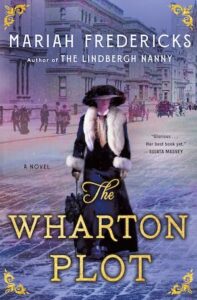 I am a big fan of Mariah Fredericks’ vivid historical fiction. I adore her Jane Prescott series, featuring a lady’s maid in 1910 New York, in which Jane ends up investigating crimes with the blessing of the family she works for, often with the help of a friendly investigative reporter. Mariah’s now moved toward standalone historical novels – in 2022’s The Lindbergh Nanny she followed the kidnapping through the eyes of the nursemaid to the baby. In The Wharton Plot, Edith Wharton herself takes on the true murder of a well known (at the time) author, David Graham Phillips.
I am a big fan of Mariah Fredericks’ vivid historical fiction. I adore her Jane Prescott series, featuring a lady’s maid in 1910 New York, in which Jane ends up investigating crimes with the blessing of the family she works for, often with the help of a friendly investigative reporter. Mariah’s now moved toward standalone historical novels – in 2022’s The Lindbergh Nanny she followed the kidnapping through the eyes of the nursemaid to the baby. In The Wharton Plot, Edith Wharton herself takes on the true murder of a well known (at the time) author, David Graham Phillips.
Set in her comfort zone – 1911, gilded age New York – Fredericks brings alive Wharton’s life and channels her thoughts. As the book opens, Edith is having lunch with her publisher when they are joined by Phillips, who she finds rude and dismissive. How could Warton understand the modern American woman? Phillips asks, as he describes his forthcoming novel, which he says will expose the true life of American womanhood. (In 1911 Wharton was the well known author of The House of Mirth.)
Edith is in a funny liminal place in her life – fed up with her marriage, unsure of a former flame’s affections, between books and just beginning to ponder the next one. Having recently turned 50, she’s starting to feel used up and, as many women feel after age 40, a bit invisible. When Mr. Phillips is shot to death the day after she meets him in front of the Princeton club she feels compelled to discover why.
Accompanied by her ambivalent beau, she agrees to attend the funeral and subsequent reception at the deceased’s apartment. At the urging of his widow, she finds herself agreeing to read the manuscript of his new book, promising she will do what she can to support it. But what Edith really wants is to get back to Paris, mainly using the book as an excuse to avoid her husband, who is suffering from early dementia.
She must read the manuscript at the publisher’s office and as she delves into it, she begins to understand the murdered man a bit more. It’s an enlightening view for her as Phillips was known as a muckraker of the lower depths while Wharton, of course, chronicled the lives of the higher echelons of society. Before he was killed, he received scary, threatening notes, and now she is receiving them as well.
This is a very New York book, clearly written by a New Yorker. As Edith and her friends bemoan the changes or loss of this building or that business, it’s the constant state of change that remains quintessentially New York, then and now. Even as Edith participates in seemingly already antiquated social events with Vanderbilts and Astor she too is evolving, moving toward a decision on her marriage, a break with her beau, and thoughts of a new masterpiece.
Her investigation takes her to the upper echelons of politics and society and through the realm of literary New York. It’s a bit of a discursive investigation but she ultimately uncovers the killer. What I most enjoyed was the visit inside the mind of one of America’s greatest writers – it’s hard to say if Wharton had some kind of existential crisis as she turned 50, but as rendered by Fredericks, it certainly seems believable. This was an interesting and unexpected read that also accomplished what I thought was impossible: a desire to re-read Ethan Frome. — Robin Agnew